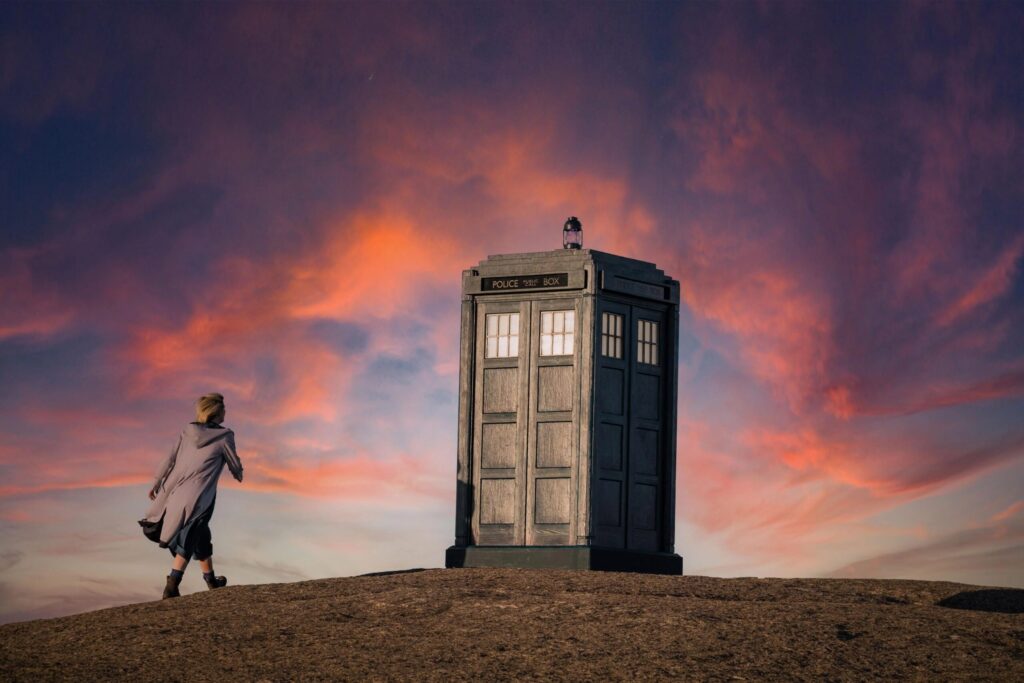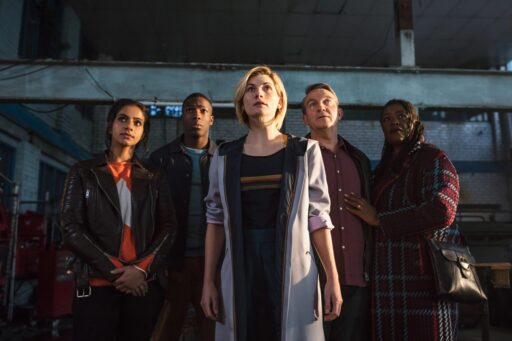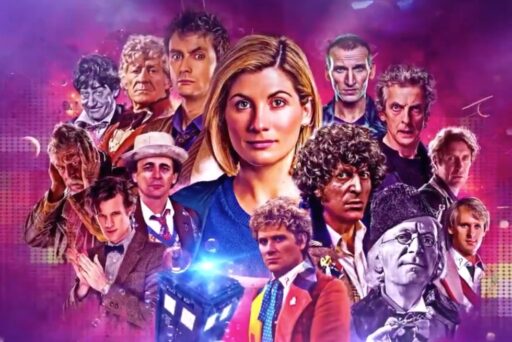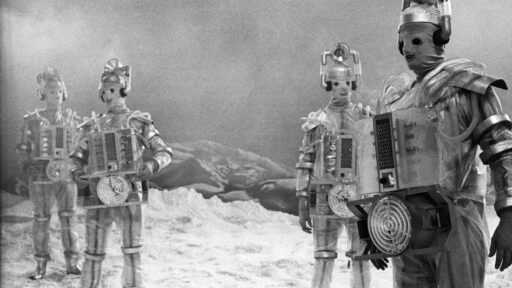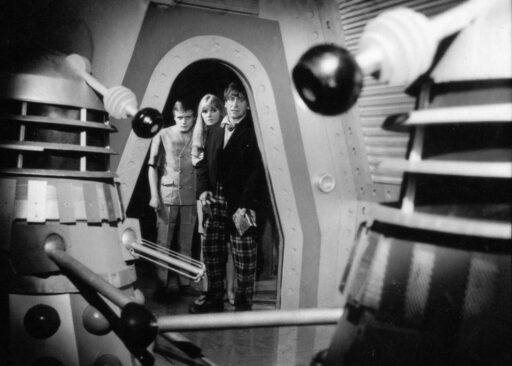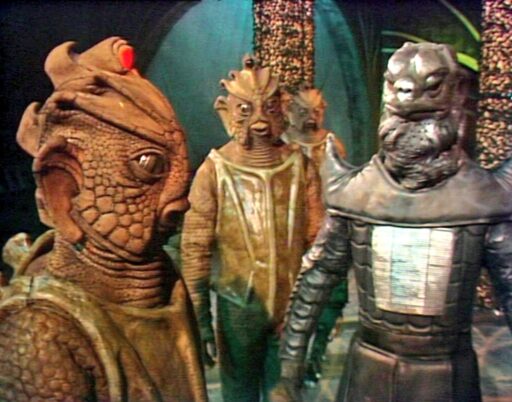Let me start by saying that I absolutely love this era’s title sequence. From that deep rumbling bass to the eerie time vortex effect, it all just works perfectly. Both suitably and familiarly alien and also distinctly different from the previous ones. All in all I’d say it’s my favorite since the show came back. I only have one negative thing to say about it, it’s too short.
Picking Up Where We Left Off
This and the previous episode are the closest that Season 11 comes to having a two part story. While this does tell its own story it’s still very much setting the stage for the era and getting the remaining pieces (TARDIS and Fam) in place. Plus, of course, it picks up right where we left off with the previous episode.
The Doctor and company are hanging around in space suffocating (presumably) but, fortunately for them and us, a couple of spaceships show up and bring them on board. I suppose you could argue that this is a co-out but for me it’s a classic cliffhanger and resolution, something we saw a lot of in Classic Who but due to the structure of modern Doctor Who it’s not that common any more.
The justification for this rescue is a hoary old sci-fi cliché, the “space race”. It’s not even the first time that Doctor Who has used that one, but in reality this time it’s mostly just an excuse to get everyone onto the planet. While the race remains a part of the story in a technical sense, it ceases to drive the plot as soon as the Doctor discovers what the Ghost Monument really is. To that extent it’s a bit of a wasted opportunity because it’s so anemically developed. Angstrom and Epzo (two of only three additional characters to feature in this episode) argue a bit about who is going to win but we’re given no reason to invest in how that turns out.

While the opening minutes of the episode are fast paced, rapid fire with things constantly in motion, once everyone is on the planet things slow down a lot. We’re introduced to the third (and final) character to feature in the story and we get an explanation of what the race is all about and why it matters. The thing is, it doesn’t matter. The resolution of the race is essentially irrelevant and none of these three characters do anything that makes a difference and not only does it take time away from the more interesting aspects of the story, but it messes with the flow.
Which is unfortunate because there are some really good character focused interactions in this episode and it I like how low key they are. The melodrama that we tend to get with Doctor Who is dialed all the way down, and that is very different, but those scenes aren’t able to build on each other effectively because of the inconsistent pacing.
Chekov’s Cigar
There’s a lot of bits and pieces in this story, some of them I like a lot, but very few of them are really developed to mean anything. We learn that the Stenza are behind the state of this planet, but they’re not present and honestly I’m left wondering if they were only used because having just featured in the previous episode they required no explanation to the audience and it was just an easy way to make a connection between the characters. It doesn’t really matter because the connection doesn’t go anywhere.
The robots are cool and provide some peril to keep the story moving but again they don’t really matter beyond giving the Doctor an opportunity to show why she prefers brains to guns, which is at least a nice character moment. Ryan’s “Call of Duty” moment was never supposed to be a good idea, he’s supposed to fail miserably which. of course. he does. It’s illustrative of both characters in that regard.
Similarly the Remnants (the cloth strips) are very creepy and effective and of course they do give us the first reference to the Timeless Child but they’re just an obstacle to overcome. They could as easily be a fence for all their narrative function. However, let’s at least give credit for the clever use of the cigar. Epzo is constantly banging on about his special cigar and I’m sure there were a lot of people like me (breaking my own rule about letting the story tell itself) who said to themselves “well, he’s never going to get to smoke that is he, he’s gonna die!”. This was a much more inventive use for it.
Reunion of Old Friends

Absolutely my favorite and most emotionally poignant moment of the whole episode is the end. First the Doctor really thinks she’s failed. I can’t remember the last time we’ve seen the Doctor hit this type of emotional range. They do angry and shouty and weepy but this was quiet despair. Jodie Whittaker is a phenomenal actress and anyone who says otherwise is an ignorant fool. Watch her face as she delivers the lines, her body language. At the beginning of the episode she’s talking a mile a minute, she’s taking charge, she’s being Doctory (I know it’s not a word). But here, without any big speeches and with no scenery chewing she gives as a Doctor who doesn’t know what to do next.
And what happens? Her companions are there for her. No co-dependency BS, no one is taking advantage or manipulating. We don’t get yet another take on how bad the Doctor is for everyone they meet. Instead a group of people she doesn’t know that well but who have formed a bond see she needs support and they give it. It’s a wonderful moment.
A moment that can only be topped the look on her face when the TARDIS arrives and she enters it. Her happiness to be reunited with the TARDIS is infinitely stronger to me than the anthropomorphism that the show sometimes indulges in.
We’re Not in Kansas Anymore
As with the previous episode this looks different to what we’ve had before. Part of that is the new cameras and the filming style that comes with it (anamorphic lenses and a wide-screen aspect ratio leading to a cinematic look), but also in this case it’s the location. This is very obviously not some part of the UK pretending to be another planet and that makes it look more alien. The landscapes are gorgeous. It looks big, it looks dramatic. There’s an ambition here that is admirable.
I also want to specifically call out that scene where the TARDIS is revealed to us. Clearly there are issues with this particular set and its design that are far from ideal ,and we’ll see that impacting later episodes, but right here it looks amazing. Once again they use light and shadow to great effect with the dim lighting allowing the glow from the console to really color the scene. It doesn’t hurt that this TARDIS design is visually striking and radically different to previous ones. The first impression is a good one.
Let’s Talk About Ryan
The character focus in this episode is really on the Doctor and Ryan. Graham gets a little bit due to his connection with Ryan’s storyline, Yaz much less so. I’m not someone who thinks that every character has to get equal attention in every episode, so for where we are in the season now I have no real issues with that. We’ll address how, or if, it evens out as the season runs its course.
Tosin Cole’s performance as Ryan though may be criminally underrated. In the show Ryan is a 19 year old black teenager who has just lost his mother figure and has a strained relationship with someone who wants to be a father figure, but who he isn’t entirely comfortable with. He’s proud and defensive and desperate to assert his independence despite being faced by an alien planet on top of his grief. They even manage to weave his dyspraxia in quite discretely.
Tosin plays this so convincingly, Ryan’s reactions tend to be muted (mustn’t show you’re too impressed) but there are sparks of anger and defiance scattered amongst that. A moment impetuous foolishness but then later a moment of weakness and vulnerability. It would have been so easy to have made this character to a walking stereotype but to this point they’ve completely avoided that.
It’s also interesting to note that this is a character that’s being built up largely by conversations and acting. Chibnall’s Who is often criticized for doing a lot of telling, and at times it does (the scene in the tent for example) but this is a clear example that it’s not due to inability on Chibnall’s part which raises the possibility this is a deliberate stylistic choice.
Less Than The Sum of Its Parts
I’ve said some nice things about various elements in this episode but I think it’s fairly clear that it doesn’t really work for me as a whole. Given that it’s written by Chibnall and follows on so directly from The Woman Who Fell to Earth I almost feel like it would have been better if instead of telling a standalone story here they’d just taken the key elements and put them in an extended first episode. However, I’m not a fan of putting a story up against one I just created in my head because it’s a fundamentally unfair comparison that doesn’t require me to write dialogue, cast, act or direct the story. The things in my head are perfect, actual tv production is compromise. Suffice to say that The Ghost Monument doesn’t work for me as a story in its own right.
It also feels like this is a show that wants to take itself a bit more seriously than modern Doctor Who has to this point, but those serious and subdued character interactions sit a little awkwardly next to the fast paced action that people expect from this show. If this Doctor Who wants to grow up and present like an adult, maybe it has to grapple with the fact that a lot of Who’s appeal is it’s childish nature. It’s hard to be both and by trying to be too many things at once and it seems unable to quite be any of them.
And yet, while it is uneven and not entirely successful there is so much I like, about this Doctor, about these companions and how they interact with her, that I find it hard to really hold the failings against the story even while recognizing they are failings. The individual moments are sometimes joyous, plus that scene at the end with the TARDIS makes up for an awful lot.
Rating: Why are you looking for a number instead of reading what I wrote?
Discover more from Veristopia
Subscribe to get the latest posts sent to your email.


